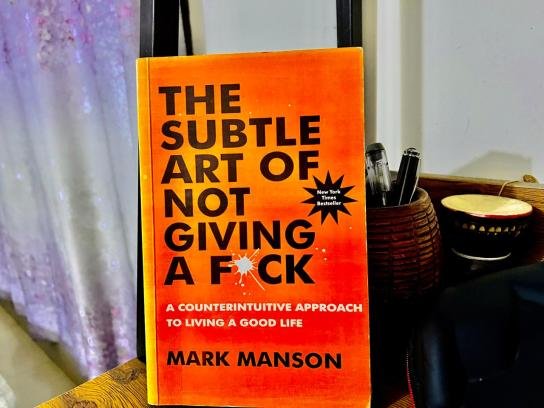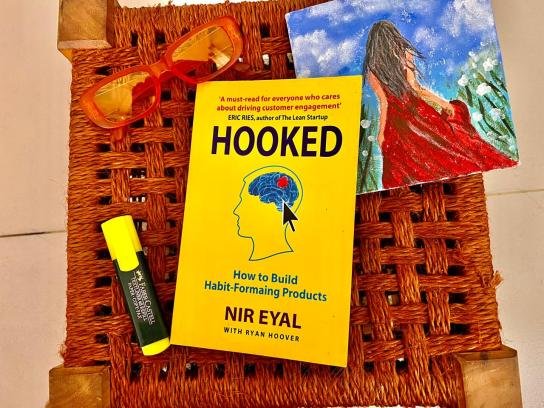Recent Reading
The Subtle Art of Not Giving A F*ck: Not a real book review
By Mehedi Shamim | 12 Aug, 2024

This book is a huge hit all around the world. People are hooked on it because it really captivates their interest. But it's not just a fluffy read – it's packed with tons of useful stuff to help you make decisions and grow as a person. When I first read it, it took me two weeks to finish because there's so much to learn and apply to our lives. Then, during a blackout in Bangladesh, I dove back into it. Each chapter is like a goldmine of valuable info, so I was inspired to write a blog about the parts that really spoke to me.
Mark Manson, the author of the book, immediately transports you to a new world with the opening line of each chapter, prompting you to contemplate your perspective on life. While some may assume the book simply encourages disregarding everything, it actually presents a counterintuitive approach to leading a fulfilling life and imparts valuable lessons on living happily.
With that being said, let's begin with my analogy.
Chapter #1: Don’t Try
In this chapter, Mark introduces Charles Bukowski, who was known for being an alcoholic, womanizer, cheapskate, and poet. Despite facing numerous challenges, Bukowski found success later in life but did not necessarily become a better person as a result. This emphasizes the difference between attaining success and embracing principles.
1.1 The Feedback Loop From Hell: These days, everywhere you turn – whether it's the news, social media, or simply chatting with people – it feels like you're being told why you're not doing well in life. This constant negativity overload is making many of us stressed, overly critical of ourselves, and just plain anxious. That's why learning to let go and not sweat the small stuff is key.
1.2 The Backwards Law: The quest for a more positive experience can ironically lead to a negative one while embracing one's negative experiences can yield positive outcomes. For instance, the more you yearn to be rich, the more you may feel lacking, regardless of your wealth. The more you seek happiness and love, the more isolated and fearful you might become, even among loved ones.
This "backward" law means that not caring too much can lead to positive results. Our positive experiences often stem from enduring negative ones. For example, achieving a fit physique requires adhering to a strict diet and consistent exercise, illustrating the cyclical nature of life. Every worthwhile endeavor involves overcoming associated challenges.
This resonated with me personally, as I've found that it's often the things I didn't stress over that made the most difference in my life.
1.3 Framework: The Subtle Art of Not Giving A F*ck:
#1 Not caring too much isn't about being uncaring; it's about feeling okay with being different.
#2 To ignore tough times, focus on something more important.
#3 Whether you know it or not, you're always choosing what really matters to you.
Chapter #2: Happiness Is A Problem: Finding happiness isn't like solving a math problem. Feeling dissatisfied and uneasy is just part of being human, and ironically, these feelings are essential for achieving lasting happiness.
2.1 Disappointment Panda: Mark creates a superhero named Disappointment Panda. His special ability is to tell people the tough truths they need to hear but don't want to. He'd show up at people's doors, hold up a mirror, and give them a reality check.
He's the hero nobody wants, but everybody needs.
We're wired to always want what we don't have and to be content with what we do have. So, instead of wishing for a problem-free life (which doesn't exist), aim for a life filled with meaningful challenges.
2.2 Framework: Happiness
#1 Life always has challenges, but finding joy comes from overcoming them.
#2 Emotions play a role, but negative feelings push you to take action, while positive ones are rewards for doing the right thing.
#3 Pick your battles wisely. Instead of asking what you desire in life, consider what difficulties you are willing to face or endure. This mindset can drive you toward greater achievements, building your confidence and motivation. Eventually, you may even find satisfaction in the journey, knowing you are prepared for the obstacles ahead.
Chapter #3: You are not special
Accept — that no one is exceptionally unique. The concept of grade inflation was introduced to boost the confidence of those who struggle academically.
3.1 Things Fall Apart: Two Forms Of Entitlement
#1 Grandiose Narcissism: "I'm amazing, and all of you are terrible, so I should be treated specially."
#2 Victim Narcissism: "I'm not great, and all of you are terrific, so I should be treated specially."
However, entitlement is ultimately unsuccessful because it doesn't lead to happiness. The real measure of self-worth isn't how someone feels about their positive experiences, but rather how they handle their negative experiences.
3.2 The Tyranny of Exceptionalism
At some point, we all need a reminder of reality. We can't excel in everything, but we can excel in something specific. Achieving greatness in a particular area requires immense dedication, hard work, and energy. Just because you're a talented engineer doesn't mean you're an expert in every programming language.
3.3 I’m Not Going To Be Special
Technology has fixed old economic issues but has brought new psychological challenges. It has made our insecurities, self-doubt, and shame more public. Each person can be remarkable and achieve greatness by setting aside their ego.
Chapter #4: The Value of Suffering
Mark tells an inspiring story about Hiroo Onoda, a Japanese officer who refused to surrender after World War II. Despite search parties looking for him, he became a myth, hero, or ghost in Japan. In 1972, adventurer Norio Suzuki found Onoda in the jungle after four days of searching. Onoda explained that he kept fighting because he was ordered not to surrender. When Onoda returned home, he realized he had wasted 30 years of his life and eventually moved to Brazil in 1980.
This story shows how people can spend years dedicated to futile or harmful pursuits.
4.1 The Self-Awareness Onion
Self-awareness is compared to an onion with many layers. The more you uncover, the more tears you shed.
- First Layer: Recognizing your emotions.
- Second Layer: Understanding why we feel certain emotions.
- Third Layer: Examining our personal values and how we judge ourselves.
Being honest with yourself is tough. It means facing uncomfortable questions that hold the truth.
4.2 Shitty Values: Some values we prioritize can lead to problems in life, such as:
1. Pleasure: Pleasure is enjoyable, but it shouldn't be our ultimate goal. It's a result of happiness, not the cause.
2. Material Success: Prioritizing material success over values like honesty and compassion can be risky.
3. Always Being Right: It's important to admit when we're wrong, as it opens up opportunities for growth and learning.
4. Staying Positive: Learning to find positivity in difficult situations is a skill that can be developed over time, leading to greater happiness and resilience.
4.3 Defining Good And Bad Values: In this part, Mark talks about good and bad values:
Good Values: Based on reality, Build a positive society, Immediately and within our control
Bad Values: Based on superstitions, Harmful to society, Not immediate or within our control
Chapter #5: You Are Always Choosing (Responsibility)
Taking ownership of everything that happens in your life, no matter who is to blame.
5.1 The Choice: When we feel that we’re choosing our problems, we feel empowered. When we feel that our problems are being forced upon us against our will, we feel victimized and miserable.
5.2 The Responsibility or Fault Fallacy: We all like to take credit for success and joy. However, it's crucial to step up and take responsibility when things go wrong or when problems arise. That's how we truly improve in life.
5.3 Victimhood Chic
We should pick our battles carefully, while simultaneously attempting to empathize a bit with the so-called enemy.
Chapter #6: You’re Wrong About Everything — But So Am I (Uncertainty)
Recognizing that you don't know everything and regularly questioning your own beliefs. Growing is a continuous journey where we move from being "wrong" to "right" rather than from "wrong" to "just a bit less wrong."
6.1 Architects of Our Own Beliefs: The human mind is full of mistakes. It might be hard to accept, but it's really important to understand.
6.2 The Danger of Pure Certainty: We should reflect on our values and be willing to question them, admitting when they no longer align with who we are, as our own ignorance can outweigh everything else.
6.3 Law of Avoidance
Parkinson’s Law: Work takes up all the time you give it to get done.
Murphy’s Law: If something can go wrong, it will go wrong.
Manson’s Law: The more a challenge challenges your identity, the more you'll avoid it.
Chapter #7: Failure Is The Way Forward (Failure)
Being open to finding and fixing your own faults and errors for improvement.
7.1 Pain Is Part Of The Process: Get used to enduring the pain you've decided on. When you adopt a new value, you're also bringing a new kind of difficulty into your life. The things you desire won't come effortlessly, but as you learn to appreciate the struggles along the way, you'll reach greater heights in life.
7.2 The “Do Something” Principle: Just start by taking a simple step - help someone by listening to their issue and offering your time. Try it just once. You can be your own inspiration and drive. If you're unsure about what to do, reframe the problem because reshaping the problem will guide your next move. Remember, action leads to motivation - not the other way around.
Chapter #8: The Importance Of Saying No (Rejection)
Being able to say and hear ‘no,’ clearly sets boundaries for what you will and won't allow in your life.
8.1 Rejection Makes Your Life Better: Having the ability to say ‘no’ and listen to it, and clearly establishing limits for what you will and won't accept in your life.
8.2 How to Build Trust: Building trust takes time—it takes much longer than breaking it. If someone breaks your trust, you need to see a consistent pattern of improved behavior.
Trust is like a delicate china plate. If it breaks, with care and attention, you can piece it back together again.
8.3 Freedom Through Commitment: When you're committed to something, you'll give it your all no matter how tough it gets. This applies to relationships, career goals, health, and more.
Commitment lets you concentrate on a few crucial goals and attain greater success than you would otherwise.
Chapter #9: …And Then You Die (Contemplation and Morality)
When faced with death, it becomes crystal clear what really matters to you. Close your eyes and think about what you want to achieve and what issues you want to resolve before you die. In essence, ‘self-improvement’ is about prioritizing important values and choosing what truly matters. By focusing on what's truly important, you'll face better challenges, leading to a better life.



